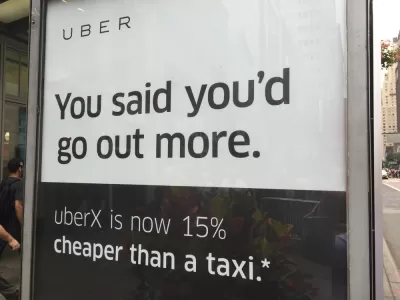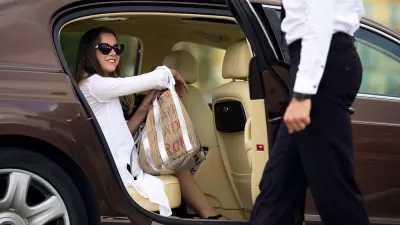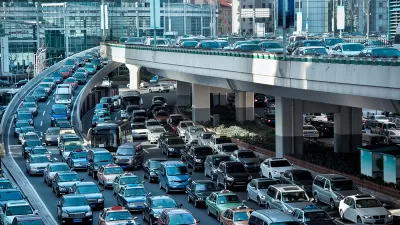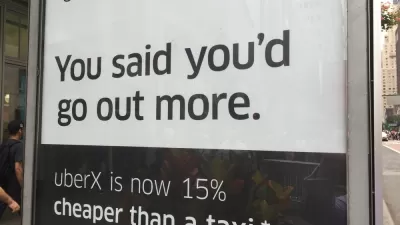New research published in Transport Policy finds that ride-hailing companies increase vehicle miles traveled of users by 97 percent in Chicago, 114 percent in New York City, and 118 percent in San Francisco.

[Updated January 27, 2020] New analysis by Schaller Consulting, published in the Transport Policy journal, quantifies the effect of ride-hailing companies on the amount of automobile travel (measured by vehicle miles traveled) by users.
Kea Wilson provides analysis of the new study, noting that the study accounts for "all the miles that drivers spent circling or heading to their pickups — aka dead-heading," in addition to the amount of time drivers spend in route to a paying customer's destination. The non-customer driving is significant: dead-heading "accounts for as much as 48 percent of the average e-taxi driver’s total mileage in some cities," according to Wilson's explanation of the report's findings.
Wilson summarizes the realities of ride-hailing, as indicated by the study's findings:
In every region in the study, the customers of transportation network companies at least doubled their total vehicle miles travelled compared to the modes they told researchers they would have taken had Uber and Lyft not been around. Schaller found collective VMT increases of a whopping 97 percent in Chicago, 114 percent in New York City, 118 percent in San Francisco, 157 percent in Boston, and 118 percent in the California suburbs.
Ride-hailing companies have the tools to limit this excess driving, however. Pooling rides, an optional service offered by the major ride-hailing companies, reduces vehicle miles traveled significantly.
As noted by Wilson, the study isn't the first to quantify the ways in which ride-hailing companies increase driving, rather than delivering reduced vehicle miles traveled as some had hoped when the business model went mainstream. A recent study showed that ride-hailing companies induce car ownership, and thus more driving. An earlier study showed that ride-hailing companies poach transit ridership.
FULL STORY: Study: Taking An App Taxi More than Doubles Your Roadway Impact

Florida Considers Legalizing ADUs
Current state law allows — but doesn’t require — cities to permit accessory dwelling units in single-family residential neighborhoods.

Manufactured Crisis: Losing the Nation’s Largest Source of Unsubsidized Affordable Housing
Manufactured housing communities have long been an affordable housing option for millions of people living in the U.S., but that affordability is disappearing rapidly. How did we get here?

Research Shows More Roads = More Driving
A national study shows, once again, that increasing road supply induces additional vehicle travel, particularly over the long run.

EV Chargers Now Outnumber Gas Pumps by Nearly 50% in California
Fast chargers still lag behind amidst rapid growth.

Affordable Housing Renovations Halt Mid-Air Amidst DOGE Clawbacks
HUD may rescind over a billion dollars earmarked for green building upgrades.

Has Anyone at USDOT Read Donald Shoup?
USDOT employees, who are required to go back to the office, will receive free parking at the agency’s D.C. offices — flying in the face of a growing research body that calls for pricing parking at its real value.
Urban Design for Planners 1: Software Tools
This six-course series explores essential urban design concepts using open source software and equips planners with the tools they need to participate fully in the urban design process.
Planning for Universal Design
Learn the tools for implementing Universal Design in planning regulations.
City of Moreno Valley
Institute for Housing and Urban Development Studies (IHS)
City of Grandview
Harvard GSD Executive Education
City of Piedmont, CA
NYU Wagner Graduate School of Public Service
City of Cambridge, Maryland





























